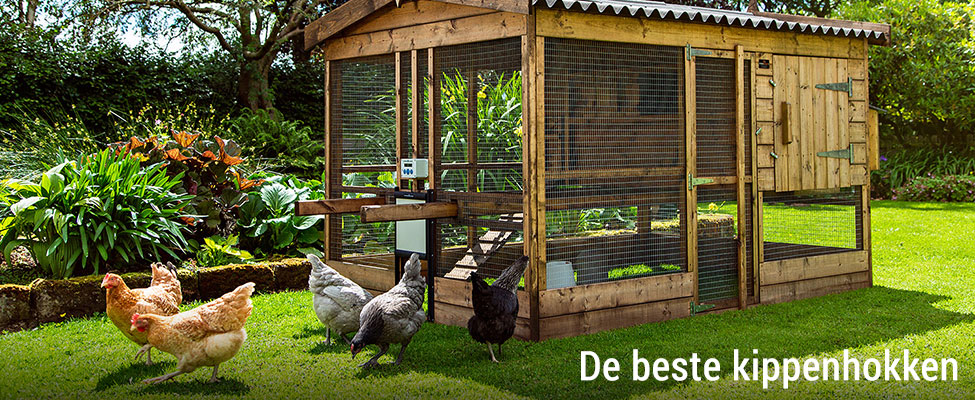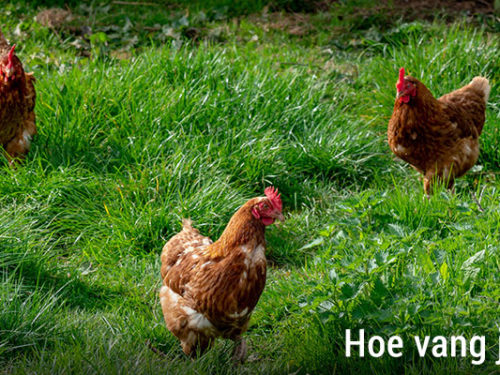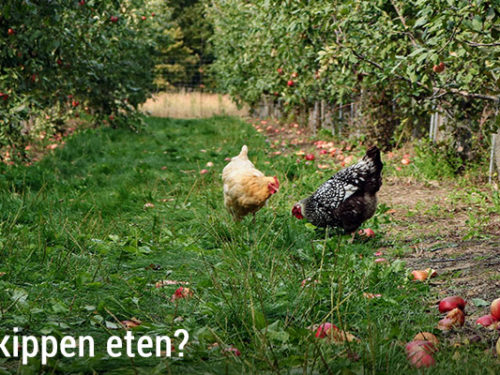
One of the first things future chicken farmers should know is where and how to house their chickens. The good news is that there is a wide choice of chicken coops to suit everyone’s aesthetic preference and budget.
However, with a seemingly endless array of choices on the market today, it can be tricky knowing which hutch is right for you and your feathered friends.
But do not worry! Here at ChickenGuard, we’re happy to help. We’ll give you information to help you choose the best chicken coop, as well as some top tips for making your chickens’ new home as safe and comfortable as possible.
How to protect a chicken coop from foxes
Foxes can be found in urban or rural areas, so wherever you live it is very important to make sure your chickens’ home can withstand a potential attack.
Keep in mind that a fully grown adult fox can easily climb walls and fences up to six feet high and crawl through holes up to four inches in diameter. Also know that they can chew through thin wire with their teeth or dig under thicker ones.
Given the different ways a smart fox can stalk your chickens, is it even possible to protect your feathered friends? The answer is yes! So, how do you guarantee a fox proof run?
First, it’s important to reinforce any mesh that comes with your coop with a thicker, firmer alternative that a fox can’t bite through. You will certainly find a thicker mesh at your local hardware store that you can easily attach to the existing mesh container with industrial staples or metal straps.
There are also several ways to prevent foxes from digging underneath the mesh. First, you can attach a permanent mesh floor to the coop, which will keep foxes from digging for your chickens. You just need to leave big enough holes (about 6 “x 6”) for your chickens to reach the ground below.
Install an automatic door
The idea for ChickenGuard actually came from our founder, Ben, whose very first chickens fell prey to a crafty, sneaky fox.
Determined to ensure his chickens would never be attacked again, Ben designed the very first automatic door for the chicken coop . Today, in addition to our automated doors, we also sell self-locking door sets, with anti-claw protection, which add extra security to your chickens’ home.
How far should a chicken coop be from your house?
There is no hard and fast rule as to how far your chicken coop should be from your own home. In fact, the answer depends on several factors.
So, what should you consider before deciding where to place your chicken coop? It is recommended that the outdoor area for chickens provides protection from the sun, bad weather and wildlife, so consider placing your coop near natural shelter in your yard if possible. It is also recommended that your chickens have access to dry soil so they can forage and dust baths.
Practically speaking, the size of your yard and the amount of space available also play a big role in determining where to put the chicken coop.
And while there are no specific laws about keeping chickens in your backyard, make sure to stay on the right side of nuisance laws! Municipalities are required to investigate complaints about noise, odor and pest attraction, so it is imperative that you try to keep everything as hygienic as possible!
Can I keep chickens in an allotment garden?
Yes! It is allowed to keep a number of chickens – as long as they are not used for business or profit. For the exact local legislation, it is best to contact your municipality or city. However, keep in mind that if your chickens are considered a nuisance or their welfare is questioned, they can be removed.
How much space do your chickens need?
You will find that most coops have a recommendation on how many chickens they are suitable for, but as a rough guide the minimum rule of thumb is about 5 to 6 square feet per chicken outside in the run and 0.5 square feet per chicken in the coop. More space is better, however, and it is recommended that you buy a pen that will fit more chickens than you intend to have – for example, if you want four chickens, buy a pen that is large enough for six.
There are a whole host of problems that can arise when you put chickens in too tight a space, including pecking and aggressive behavior, ammonia build-up or reduced egg production – so it’s very important to choose a pen large enough to accommodate your flock !
The best chicken coops
Which chicken coop is best depends on the needs of you and your feathered friends.
As long as your coop is warm, dry, comfortable, safe from predators and has plenty of room for your flock, the choice is yours.
If you want some inspiration, home and garden blog Inspirations Deco has put together an overview of some of the strangest and wonderful examples out there. Where you can see that the chicken lovers have actually gone to town! Or does someone want a Harry Potter themed chicken coop?
Plastic chicken coops
Plastic chicken coops are relatively new and have quickly found loyal fans.
One advantage that elevates plastic hutches above their wooden counterparts is that they are very easy to clean – in fact, most can be cleaned, cleaned and dried within half an hour! They also require virtually no maintenance.
Unlike wood, however, plastic is not a breathable material, so adequate ventilation is a necessity! Inadequately ventilated chicken coops can lead to condensation, which can cause all kinds of nasty illnesses in your chickens, including respiratory disorders.
Wooden chicken coops
The main selling point of wooden chicken coops is that they offer a lot more choice when it comes to design, which is great if you fancy housing your chickens somewhere luxurious (and trust us, there are some very nice options!). They give you a lot more flexibility for customization and you are sure to find a wooden chicken coop that is just right for the needs of your garden and those of your chickens.
When it comes to choosing between the two, poultry expert Andy Cawthray gives the following advice : “The plastic versus wood debate has been going on in the poultry world for a few years now. I use both and they each have their pros and cons: when it comes down to it, it’s about personal preferences. As long as the pen has been designed with both the keeper and the poultry in mind, and preferably designed by someone whose experience with poultry extends beyond a visit to the butcher, then both wooden and plastic housing are equally suitable. “
Chickens Arken
Ook bekend als kippentractor, het belangrijkste verkoopargument van een kippentractoris dat ze kunnen worden verplaatst. In theorie geeft dit je de mogelijkheid om elke dag naar een andere plek te verhuizen –dit is natuurlijk afhankelijk van de grootte van je tuin!
While not practical for everyone, chicken tractors can provide a whole host of benefits for you and your chickens. First, moving your chicken coop means that the chickens are fed a more varied diet, which is great for their overall health. It can also be good news for your garden, as the chickens’ foraging and feces keep your plants in top condition. Finally, a chicken park can be moved to a safer location when bad weather arrives, so your chickens can stay in the shade if it gets too sunny and be safely sheltered in the event of a heavy rain.
Are you thinking about buying your own chicken hen and need advice? Or maybe you are an experienced chicken farmer with wisdom to share. Head over to our Facebook page today to join the conversation. We would like to hear from you!






